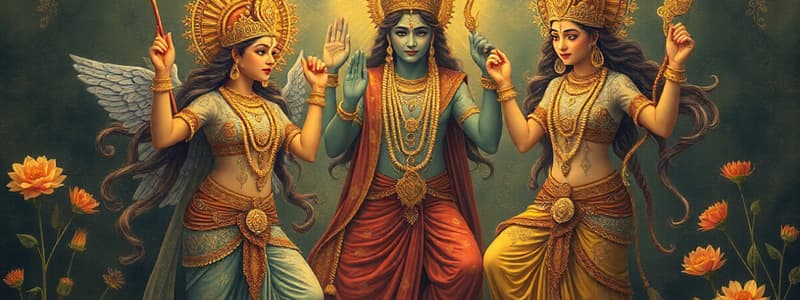Podcast
Questions and Answers
What term is commonly used to describe a personal god in Hindu philosophy?
What term is commonly used to describe a personal god in Hindu philosophy?
- Ishvari
- Ishvara (correct)
- Bhagavati
- Deva
Which of the following pairs represents a combined deity in Hinduism?
Which of the following pairs represents a combined deity in Hinduism?
- Harihara (correct)
- Vishnu and Lakshmi
- Brahma and Saraswati
- Parvati and Ganesha
In which philosophical context are deities considered as natural sources of energy?
In which philosophical context are deities considered as natural sources of energy?
- Vedanta
- Yoga
- Brahmanism
- Samkhya (correct)
Which tradition rejects the concept of deities and adopts monotheism similar to Abrahamic religions?
Which tradition rejects the concept of deities and adopts monotheism similar to Abrahamic religions?
Which of the following deities is not part of the major group mentioned in the content?
Which of the following deities is not part of the major group mentioned in the content?
Flashcards are hidden until you start studying
Study Notes
Hindu Deities
- The term "Deity" in Hinduism encompasses a diverse range of gods and goddesses within its various traditions.
- Hindus can hold various beliefs, including polytheism, pantheism, monotheism, monism, agnosticism, atheism, or humanism.
- Deities are referred to using various terms and epithets, including Deva, Devi, Ishvara, Ishvari, Bhagavān, and Bhagavati.
- The concept of Hindu deities has evolved throughout history, from the Vedic era (2nd millennium BCE) to the medieval era (1st millennium CE), and continues to evolve across regions and diverse traditions in Nepal, Pakistan, India, Southeast Asia, and beyond.
- The number of deities varies widely, ranging from thirty-three in the Vedas to hundreds in the Puranas.
- Major deities include Vishnu, Lakshmi, Shiva, Parvati, Brahma, and Saraswati.
- These deities possess distinct and complex personalities but are often considered aspects of the same Ultimate Reality called Brahman.
- The concept of the equivalence of deities has been cherished throughout Hindu history, with depictions like Harihara (Half Vishnu, Half Shiva) and Ardhanārīshvara (half Shiva, half Parvati) symbolizing their unity.
- Major deities have inspired distinct Hindu traditions, including Vaishnavism, Shaivism, and Shaktism, yet share common mythology, ritual practices, theosophy, value systems, and polycentrism.
- Some traditions like Smartism (mid 1st millennium CE) view multiple deities as henotheistic manifestations of Saguna Brahman, a path to realizing Nirguna Brahman.
- In Samkhya philosophy, Devata (deities) are considered "natural sources of energy" dominated by the Sattva Guna.
- Hindu deities are represented through sculptures, paintings, and other forms called Murtis and Pratimas.
- Some traditions, like ancient Charvakas, rejected deities and gods entirely, while 19th-century movements like the Arya Samaj and Brahmo Samaj adopted monotheistic concepts similar to Abrahamic religions.
- Hindu deities have been adopted by other religions, such as Jainism, and in regions outside of India, including Thailand and Japan, where they are venerated in temples and art.
- Ancient and medieval texts describe the human body as a temple containing deities, and Brahman (Absolute Reality) is considered the same or similar to Atman (Self), which Hindus believe to be eternal and present in all living beings.
Studying That Suits You
Use AI to generate personalized quizzes and flashcards to suit your learning preferences.




